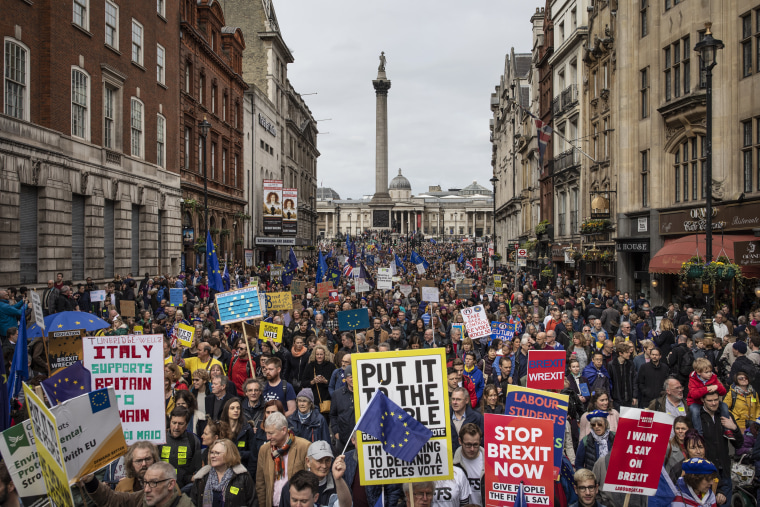LONDON — Brexit has been delayed. But for many of the lawmakers who could ultimately decide its fate, there is no breathing space from Britain’s messy and at times toxic divorce from the European Union.
Prime Minister Theresa May blamed Parliament for the chaos in a televised address to the public. And as lawmakers prepare for a week in which they could seize control of the process, many have warned that they fear for their safety amid an increasingly bitter and divisive mood in the country.
Anna Soubry, a member of parliament (MP) for Nottinghamshire who quit May’s ruling Conservative Party over her handling of the issue, said she could not go home this weekend as she doesn't feel safe.
"We are tired of being called traitors," she told reporters Friday. "When people use that language, the next thing that happens is I get an email that says — traitors get beheaded, that's what should happen to you."
In her address on Thursday, May accused lawmakers of doing everything possible to avoid making a choice on Brexit, adding that people were tired of infighting, political games and arcane procedural rows.
"It is high time we made a decision," May said, staring into the camera and telling Britons: "I am on your side."
Her government agreed an exit deal with the E.U. in November, but Parliament has voted it down twice. Weeks of extensive debate have brought no consensus on a way to move forward.
On Thursday, European leaders granted May's request for an extension to the deadline for Britain's exit, but unless lawmakers approve her deal or find some other way forward, the U.K. will crash out with no deal on April 12.
The public is growing frustrated with the lack of progress, nearly three years after they voted to leave in a June 2016 referendum.
A poll released by British broadcaster Sky News earlier this week found that a whopping 90 per cent think the handling of the country's exit from Europe is a 'national humiliation.' Thirty-four per cent of respondents said they think May's government is most to blame, while 26 per cent primarily blame Parliament.
Lawmakers from across the political spectrum, including May's own colleagues, said they felt her speech would only make matters worse.
Former attorney general Dominic Grieve said May’s “attack on the integrity of MPs is very unfortunate” while opposition Labour MP Wes Streeting tweeted that May’s speech was “incendiary,” adding that “if any harm comes to any of us, she will have to accept her share of responsibility.”
Pete Wishart, an MP from the Scottish National Party, said the prime minister’s speech left a few of his colleagues “feeling just a little bit more insecure” and called for an emergency debate on the security of lawmakers.
Anger bordering on hatred against politicians is something the U.K. has had to grapple with before.
Last fall one of the country's most prominent Brexit supporters, Conservative MP Jacob Rees Mogg, was ambushed by protesters outside his London home while with his family.
And in the most egregious case, Labour lawmaker Jo Cox was killed in a frenzied street attack a week before the 2016 Brexit vote by a white supremacist and Nazi memorabilia collector.
Perhaps with such incidents in mind, Deputy House Speaker Lindsay Hoyle wrote to MPs earlier this week advising them to take steps to ensure their safety, such as travelling home by taxi or with colleagues.
“Members of Parliament are the focal point of public attention in a manner that we have rarely seen before,” said Hoyle.
The government rejected the suggestion that the speech had put lawmakers at risk.
May later addressed the backlash herself but stopped short of an apology, saying: “I expressed my frustration and I know that MPs are frustrated too — they have difficult jobs to do.”
But whether her rebuke of Parliament was dangerous or not, it seemed to do little to help her case ahead of yet another crucial period for Brexit.
Perhaps reading the room, May hinted in an open letter on Friday that she might not bring her withdrawal agreement back for a third and final time if she doesn't have the votes.
With no clear way out of the impasse, some members of the public have sought to make their voices heard once again.
Huge crowds marched through central London Saturday to demand a new referendum on the issue.

And an online petition asking for Article 50 —a legal mechanism that triggered Britain’s divorce from the E.U. — to be revoked has garnered over five million signatures.
Next week Parliament seems set to embark on a series of so-called indicative votes that could allow lawmakers to take back control of the Brexit process.
Meanwhile, there are suggestions that May's days as prime minister may be numbered.
Reports in the British media on Sunday said she was at the mercy of a full-blown coup as senior government ministers moved to oust her and install a replacement to deliver Brexit.
Changing leaders in the corridors of Westminster, however, would likely do little to alter the dynamics of Britain's worst political crisis in at least a generation.


